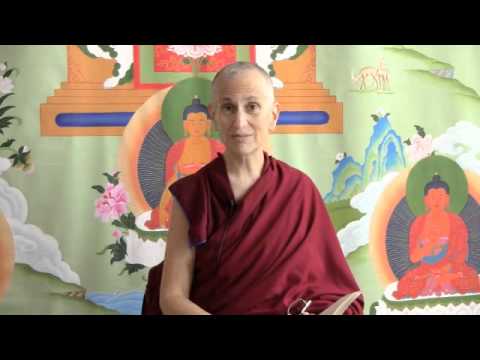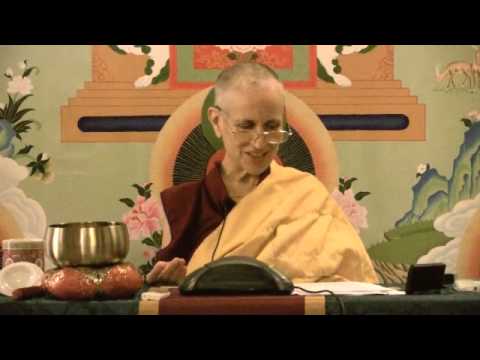Cultivating respect for karma
A Crown Ornament for the Wise, a hymn to Tara composed by the First Dalai Lama, requests protection from the eight dangers. These talks were given after the White Tara Winter Retreat at Sravasti Abbey in 2011.
- How ignorance of cause and effect causes us to go down wrong paths
- Our minds can make up so many reasons for doing the things we do
- How often do we consider the consequences of our actions done today in terms of results in future lives
The Eight Dangers 06: The elephant of ignorance continued (download)
We’ve been talking about ignorance.
Not tamed by the sharp hooks of mindfulness and vigilance,
Dulled by the maddening liquor of sensual pleasures,
It enters wrong paths and shows its harmful tusks:
The elephant of ignorance—please protect us from this danger!
We were talking yesterday about the two kinds of ignorance: the one that doesn’t know the ultimate nature and then the ignorance about conventional reality which is mostly the ignorance of cause and effect. Karma and its results.
We talked about the first two lines—how when we don’t have mindfulness and introspective awareness then the ignorance just takes over and it’s like we are deadened—or maddened—by the liquor of sensual pleasures. The mind is just off chasing them thinking that sensual pleasures are really going to make us happy. And we’re so hooked into the objects of the five senses—we think they really exist, they’re external, they exist in the way they appear to us, and if we only have these things, that’s going to do it. And so we keep chasing after them and it doesn’t do it. Doesn’t cut it. What happens instead, the ignorance makes us “enter wrong paths” and it “shows its harmful tusks.”
“Entering wrong paths….” When we don’t have the correct understanding of how karma and its effects works, then we don’t realize that our actions have an ethical dimension. Or even if we think they have an ethical dimension, we link up things in the wrong way. For example: if we were to think that animal sacrifice would please the gods and please the Buddhas, then that’s an example of ignorance. Or thinking that if we kill other people to get rid of all the non-believers that that would be good for the Dharma, then that’s an example of ignorance. And so what happens is we enter those wrong paths—there’s the ignorance and the wrong views—and then the negative actions of killing that come from that.
Or if we think that, “Well, all of these corporations have all this money, so if I cheat them out of a little bit of money, actually it’s quite all right. They can afford it.” You know? It’s still stealing, no matter what we think. Or if you think that, “Oh well, this person’s so lonely, so destitute, if I have sex with them they’ll feel better about themselves and they’ll feel loved…” You know, that’s unwise sexual conduct, but you know many people dream up all sorts of reasons to validate their bad behavior. Yes? Unfortunately, those many people are US. [Laughter]
But we always have reasons to establish why our mistaken actions are actually really something good. And we invent all sorts of philosophies and stories and, you know, “it’s really for the benefit of sentient beings… I’m really trying to help this person and it’s for their own benefit…” Actually what we’re trying to do is kind of up our ego, or control other people, but you know, we can’t see any of it, so we just think, “Oh, I’m doing something good.”
This is all ignorance of karma, actions—our actions and the motivations for our actions—and then the effects that these actions are going to bring; not only in this life, but also in future lives.
Sometimes we only wake up when there’s some kind of problem in this life. And then we’ll go, “Oh, boy, I really made a mess.” But we’re not even thinking what kind of karma did I create for future lives. You know, it’s only because we got in trouble this life that we begin to even think about things. Whereas, we could have been going along the whole time making all sorts of problems for future lives, and never even recognizing it. And even at this time, not even recognizing it. Then our way to resolve our ignorant actions is to patch it up this lifetime somehow—to protect ourselves—but we don’t even think of purifying the imprints of the negative karma we’ve created. So that’s more ignorance.
Audience: I was wondering, actually, if, since we can’t see the effects of our actions in future lives, and it’s difficult to gain an understanding of karma in general without screwing up and experiencing negative results in this very life, how can we gain faith in karma…?
Venerable Thubten Chodron: Okay, in lieu of screwing up, how do we get faith in karma?
Well, I think just even watching—in this lifetime, before we screw up—how our actions bring results. You know? And then stretching our minds so instead of just thinking they only bring results in this lifetime, think they’re going to bring results in future lifetimes, too. Because, after all, right now we’re experiencing a lot of experiences. Do we ever wonder why these things are happening to us? “Why does this happen to me? Well it’s somebody else’s fault!” Well, sorry, it’s not. We created the causes to be in this situation. And even our pleasant experiences, why do we have them? Are they because God did it, or some other deity gave us some boon? No. It’s because we created the cause—very often, in previous lives. And so just by thinking about cause and effect, but don’t limit it to the birth and death of this life, but go before our birth and after our death to see how ethical cause and effect functions.
Venerable Thubten Chodron
Venerable Chodron emphasizes the practical application of Buddha’s teachings in our daily lives and is especially skilled at explaining them in ways easily understood and practiced by Westerners. She is well known for her warm, humorous, and lucid teachings. She was ordained as a Buddhist nun in 1977 by Kyabje Ling Rinpoche in Dharamsala, India, and in 1986 she received bhikshuni (full) ordination in Taiwan. Read her full bio.


